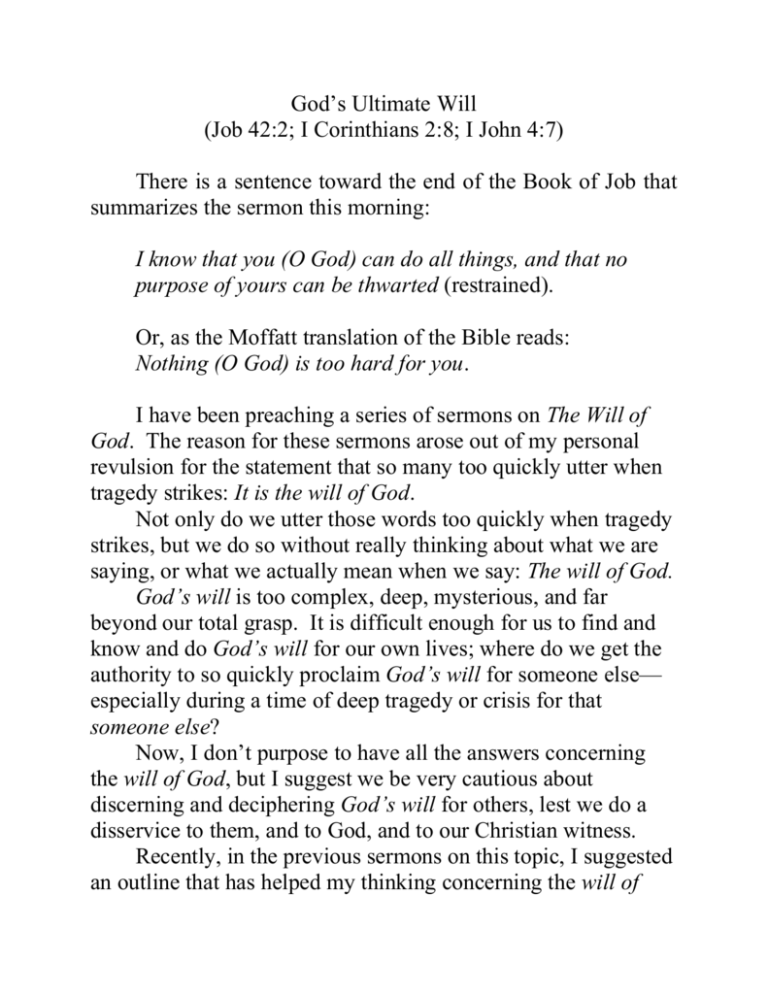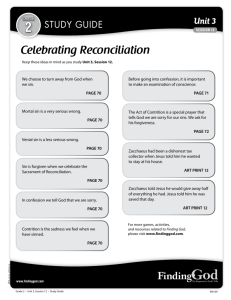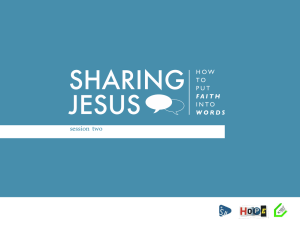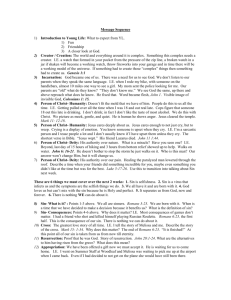God's Ultimate Will - Bethlehem United Methodist Church
advertisement

God’s Ultimate Will (Job 42:2; I Corinthians 2:8; I John 4:7) There is a sentence toward the end of the Book of Job that summarizes the sermon this morning: I know that you (O God) can do all things, and that no purpose of yours can be thwarted (restrained). Or, as the Moffatt translation of the Bible reads: Nothing (O God) is too hard for you. I have been preaching a series of sermons on The Will of God. The reason for these sermons arose out of my personal revulsion for the statement that so many too quickly utter when tragedy strikes: It is the will of God. Not only do we utter those words too quickly when tragedy strikes, but we do so without really thinking about what we are saying, or what we actually mean when we say: The will of God. God’s will is too complex, deep, mysterious, and far beyond our total grasp. It is difficult enough for us to find and know and do God’s will for our own lives; where do we get the authority to so quickly proclaim God’s will for someone else— especially during a time of deep tragedy or crisis for that someone else? Now, I don’t purpose to have all the answers concerning the will of God, but I suggest we be very cautious about discerning and deciphering God’s will for others, lest we do a disservice to them, and to God, and to our Christian witness. Recently, in the previous sermons on this topic, I suggested an outline that has helped my thinking concerning the will of 2 God, and I shared it with you in hopes that it might be of some service to you, also. The outline is not originally mine. It comes from the Reverend Dr. Leslie Dixion Weatherhead, a famous English pastor and theologian of the last century. He suggests, and I agree, that when we consider the will of God, that we should think of it in three ways: 1. God’s Intentional Will. 2. God’s Circumstantial Will. 3. God’s Ultimate Will. In past sermons I have spoken of God’s Intentional Will— that is, God’s original plan for the well being of all God’s children and creation, an intention spoiled by our sin and folly and our freedom to live other than God would have us live. I have also preached about God’s Circumstantial Will— God’s will within the circumstances just mentioned—our free choice to live contrary to God’s Intentional will—our disobedience and turning away from God. I want to preach this morning on God’s Ultimate Will—the goal which I believe God reaches, not only in spite of all our sin and disobedience, but even using our sin and disobedience to further God’s own plan—turning our sin and disobedience into the good by redeeming the moment—the circumstances. Turning to the cross once more as the supreme example or illustration, we see that the Intentional Will of God was not that Jesus should be crucified, but that Jesus should be followed, loved and obeyed, thereby changing the world and ushering in The Kingdom Of God. In I Corinthians 2:8 Paul writes: None of the rulers of this age understood this; for if they had, they would not have crucified the Lord of glory. 3 But there would be a long wait for the Kingdom of God Triumphant to come about because of the sin and disobedience of humankind in the way humankind responded to the Jesusevent—the Incarnation. (God shows up in Jesus saying: Here I am; and they kill him). God’s Circumstantial Will under those circumstances, was that Jesus should in faith accept death (even death on a cross), but to accept it in such a positive and creative way as to lead to forgiveness and resurrection—forgiveness of sin and resurrection for you and me—God’s Ultimate Will—the redemption (salvation) of men and women and boys and girls. Winning us back to God, not in spite of the cross, but through the power of the cross and resurrection—God’s grace—that God, through Jesus, even forgives those who would kill God-inJesus. It was not God’s intention to use the cross for our salvation, but to use Jesus and his love as he lived among the people of first century Palestine. The cross was the doing of evil men— they put Jesus on the cross, not God. But under those circumstances, see what God did with, and through that ugly scene—God’s Grace saved all who would believe. The picture in my mind is that of children playing beside a tiny stream that runs down a hillside to join a river in the valley below. Very little children can divert the stream and get great fun out of damming it up with sticks and stones and mud, but not one of them ever succeeds in preventing the water from reaching the river at last, and the sea. In regard to God, we are all very little children. Though we may divert and hinder God’s will, I don’t believe we ever finally defeat God’s Ultimate Will. And frequently, our mistakes, sins, and disobedience are used to make another channel to carry the 4 waters of God’s will to the river and sea of God’s purposes— God’s Ultimate, final goal or will. The omnipotence of God, I hope you understand, does not mean that by a sheer exhibition of God’s power—superior might, God gets God’s own way. If God did, our freedom God gave to us in the story of the Garden of Eden would be an illusion. No end which God has in mind can be imposed from without; for God’s end and God’s will for us all, which is salvation, must come from within our own free choice of God’s way, not the imposition of God’s forced will in irresistible might which leaves no room for our free choice. Omnipotence—all-powerful (and God is all powerful), means the ability to achieve purpose. Since the purpose of God’s power is to win our obedience, love and devotion, any activity of God’s which denies or suppresses our freedom of choice to obey God, would defeat God’s purpose—would not be a use of power, but a confession of weakness and an acceptance of defeat. Why? Because God’s power comes from God’s perfect love. Love is the most powerful force in all creation, and the Bible says that God is love (I John 4:7). With this in mind and heart, concerning an omnipotent—all-powerful God, the power to reject or discard power is itself an expression of power. Instead of giving up on us and destroying us, God loves us and provides a way for us to be put in a right relationship with God. When we say, then, that God is omnipotent, we do not mean that nothing can happen unless it is the will of God. We mean that nothing can happen that can finally defeat God, or God’s will for us. Our Creator has given us the gift of freewill. We do not live alone. No one is an island. Many lives touch our life, and 5 our life touches many lives. We are bound together in such close unity that the one suffers for the many, and the many suffer for the one. One gains through the many, and the many gain through the one. If, in a word, life is to be lived on the human-family basis, and not on the individual basis, then obviously many things can happen—can go wrong that God did not intend, and people are hurt—innocent people suffer because of the choices others make. Yes, we dam up and divert the streams of God’s will, but God will find a way to work out God’s Ultimate Will. I know, said Job, that you can do all things, and that no purpose of yours can be restrained. You may argue, then: Very well, let us not bother ourselves, because however stupid and careless and sinful we may be, God can use evil as well as good. Let God get on with it, then. Nothing we do matters; if ‘God’s will’ ultimately triumphs anyway. Ah, but here is the old argument which Paul fought with such zeal in his epistle to the Romans. When they said: Shall we continue in sin that grace may abound? Paul said, in Romans 6: 1-2, God forbid! We who died to sin (when we accepted Christ Jesus as Savior and Lord) how shall we any longer live in sin? Once we see what sin is—the raised hand, the clenched fist, and the blow in the face of God— how can we continue to live in sin? It is one thing to say: This evil has been done. How can I win good from it? It is quite another thing to say: I will deliberately do evil in order to win good from it—I will sin because God will forgive! No, we are to move away from the sinful life in obedience, because we love the one who loved us enough to die for us. 6 And when we do, we are instrumental in helping God work out God’s Ultimate Will in our life, and in this world. God still reigns—a God who is like Jesus—who died to make a dream come true, better than our wildest dreams. Rest in the thought about God’s Ultimate Will. Paul said: Eye has not seen, nor ear heard, neither has it entered into the heart of man/woman, the things which God has prepared for those who love God (I Corinthians 2:9). Trust God. Rest in the nature of God. God who began this strange adventure we call human life will also control the end. I am the Alpha and Omega, the beginning and the end, the first and the last (Revelation 22:13). The last word for us is with God. Amen. Charles Lee Hutchens, D.Min. Bethany United Methodist Church Lexington, N.C. November 14, 2004 Preached again at Main Street United Methodist Church, Reidsville, NC on October 21, 2007. Preached again at Bethlehem United Methodist Church, Climax, NC on March 16, 2014. Source: Leslie D. Weatherhead’s book, The Will of God, copyright 1944 by Whitmore & Stone





